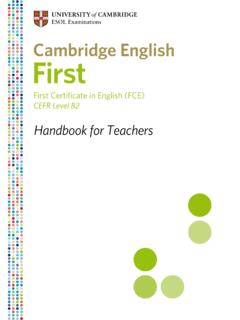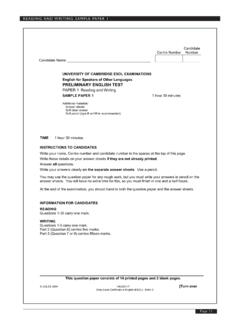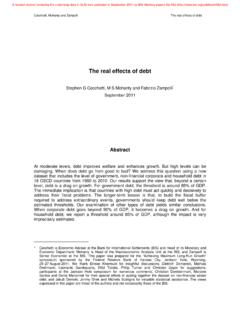Transcription of B1 Preliminary C1 for Schools - 國立臺灣大學
1 B1 Preliminary for SchoolsHandbook for Teachers for exams from 2020B1 Preliminary for SchoolsB2B1 Preliminary for SchoolsA2A1 Pre A1C2C1 Pre A1 StartersA1 MoversA2 FlyersA2 Key for schoolsB1 Preliminary for schoolsB2 First for schoolsC1 AdvancedC2 ProficiencyYour path to learning English, step by the most of your handbookThe best way to get the most from your handbook is to use the digital version. The digital version is updated more digital version contains links which take you straight to related pages if you want to find out more. For example, you can read about Part 1 of the Reading paper in the Tasks section, then click on the link to take you straight to a sample Reading Part 1 task. There are also links which take you to useful websites and sThe Tasks pages give information about the exam format and what is tested in each part of the learnersThe Preparing learners pages give information and advice about what teachers can do to prepare their learners for the exam.
2 There are also links to useful websites to find additional materials. You ll find suggested exam strategies to help learners perform to the best of their ability on the paper and assessmentThe Sample paper and assessment section includes a sample paper for each of the four components as well as an answer key for the Reading and Listening components. For the Writing and Speaking papers there is information about the assessment criteria, and for Writing there are example answers for you to refer to or use with your Cambridge Assessment English 2B1 Preliminary for Schools an overview 3 Exam support 4 About the exam 5 Paper 1: Reading Task s 7 Preparing learners 8 Sample paper and assessment 13 Paper 2: Writing Task s 20 Preparing learners 21 Sample paper and assessment 24 Paper 3: ListeningTask s 37 Preparing learners 38 Sample paper and assessment 43 Paper 4: SpeakingTask s 51 Preparing learners 52 Sample paper and assessment 58 Language specifications 66 Glossary 692 About Cambridge Assessment EnglishCambridge English Qualifications are in-depth exams that make learning English enjoyable, effective and rewarding.
3 Our unique approach encourages continuous progression with a clear path to improving language skills. Each of our qualifications focuses on a level of the Common European Framework of Reference (CEFR), enabling learners to develop and build speaking, writing, reading and listening skills. Our qualifications are based on research into effective teaching and learning. They motivate people of all ages and abilities to learn English and develop practical skills for the real world. We have Cambridge English Qualifications for: Schools General and higher education BusinessWhether learners are planning to live, work or study in their own country or abroad, our qualifications prove they have the English language skills to succeed. To find out more about Cambridge English Qualifications and the CEFR, go to are Cambridge Assessment English. Part of the University of Cambridge, we help millions of people learn English and prove their skills to the world. For us, learning English is more than just exams and grades.
4 It s about having the confidence to communicate and access a lifetime of enriching experiences and opportunities. We deliver qualifications and tests in over 130 countries to over million people every Assessment International EducationPrepares school students for life, helping them develop an informed curiosity and a lasting passion for largest assessment research capability of its kind in EuropeCambridge Assessment English We help millions of people learn English and prove their skills to the world OCR: Oxford Cambridge and RSA ExaminationsIs a leading UK awarding bodyDepartments of the UniversityDepartments (exam boards)One of the top universities in the world Oxford Cambridge and RSA3B1 Preliminary for Schools an overviewCertificatesThe certificate shows the candidate s: score on the Cambridge English Scale for each of the four skills overall score on the Cambridge English Scale grade level on the CEFR level on the UK National Qualifications Framework (NQF).Students will receive the same certificate as candidates who take B1 circumstances Cambridge English Qualifications are designed to be fair to all test takers.
5 For more information about special circumstances, go to Preliminary for Schools is an intermediate level qualification in practical everyday English language skills. It follows on as a progression from A2 Key and gives learners confidence to study for taking higher level Cambridge English Qualifications such as B2 First. Exam formatsB1 Preliminary for Schools can be taken as either a paper-based or computer-based is the exam for?B1 Preliminary for Schools is aimed at school students who want to show they can: read simple textbooks and articles in English emails on everyday subjects understand factual information show awareness of opinions and mood in spoken and written recognises the exam?The B1 Preliminary for Schools certificate is recognised around the world as proof of intermediate level English skills for industrial, administrative and service-based employment. It is also accepted by a wide range of educational institutions for study English Qualifications are accepted and trusted by thousands of organisations worldwide.
6 For more information about recognition go to level is the exam?B1 Preliminary for Schools is targeted at Level B1 on the a certificate at this intermediate level proves that a candidate has mastered the basics in English and now has practical language skills for everyday of ResultsThe Statement of Results shows the candidate s: Score on the Cambridge English Scale for their performance in each of the four language skills (reading, writing, listening and speaking). Score on the Cambridge English Scale for their overall performance in the exam. This overall score is the average of their scores for the four skills. Grade this is based on the candidate s overall score. Level on the CEFR this is also based on the overall Preliminary for Schools an overview 4 Official Cambridge English Qualifications preparation materialsTo support teachers and help learners prepare for their exams, Cambridge English and Cambridge University Press have developed a range of official support materials including coursebooks and practice tests.
7 These materials are available in both print and digital for teachersThe Teaching English section of our website provides user-friendly, free resources for all teachers preparing for our exams. It includes:General information handbooks for teachers, sample exam information format, timing, number of questions, task types, mark scheme of each for teachers developing students skills and preparing them for the lessons a lesson for every part of every qualifications a comprehensive range of qualifications for new teachers and career development for more experienced and webinars a wide range of exam-specific seminars and live and recorded webinars for both new and experienced development resources to support teachers in their Continuing Professional Development. for teachersTeachers can join our community on Facebook for free resources, activities and tips to help prepare learners for Cambridge English Qualifications. support for candidatesWe provide learners with a wealth of exam resources and preparation materials throughout our website, including exam advice, sample papers, candidate guides, games and online learning joining our lively Facebook community can get tips, take part in quizzes and talk to other English language candidates for an examExam entries must be made through an authorised Cambridge English examination centre.
8 Centre staff have all the latest information about our exams, and can provide you with: details of entry procedures copies of the exam regulations exam dates current fees more information about B1 Preliminary for Schools and other Cambridge English have more than 2,800 centres in over 130 countries all are required to meet our high standards of exam administration, integrity, security and customer service. Find your nearest centre at information If your local authorised exam centre is unable to answer your question, please contact our helpdesk: support5 About the examB1 Preliminary for Schools is a rigorous and thorough test of English at Level B1. It covers all four language skills reading, writing, listening and speaking. A thorough test of all areas of language abilityThere are four papers: detailed information on each test paper is provided later in this handbook, but the overall focus of each test is as follows:Reading: 45 minutesCandidates need to be able to understand the main points from signs, newspapers and magazines and use vocabulary and structure : 45 minutesCandidates need to be able to respond to an email and to write either an article or a : 30 minutes approximately Candidates need to show they can follow and understand a range of spoken materials including announcements and discussions about everyday : 12 17 minutes Candidates take the Speaking test with another candidate or in a group of three.
9 They are tested on their ability to take part in different types of interaction: with the examiner, with the other candidate and by of the four test components contributes to a profile which defines the candidates overall communicative language ability at this and results B1 Preliminary for Schools gives detailed, meaningful lengthNumber of tasks/partsNumber of itemsB1 Preliminary for SchoolsReading45 mins 632 Writing45 mins 2 Listeningapprox 30 mins425 Speaking12 17 mins4 Totaltotal approx 2 hrs 12 minsAll candidates receive a Statement of Results. Candidates whose performance ranges between CEFR Levels A2 and B2 (Cambridge English Scale scores of 140 170) also receive a A: Cambridge English Scale scores of 160 170 Candidates sometimes show ability beyond Level B1. If a candidate achieves a Grade A in their exam, they will receive the Preliminary English Test certificate stating that they demonstrated ability at Level B and C: Cambridge English Scale scores of 140 159If a candidate achieves a Grade B or C in their exam, they will receive the Preliminary English Test certificate at Level Level A2: Cambridge English Scale scores of 120 139If a candidate s performance is below Level B1, but falls within Level A2, they will receive a Cambridge English certificate stating that they demonstrated ability at Level the exam6 Can Do summaryWhat can candidates do at Level B1?
10 The Association of Language Testers in Europe (ALTE) has researched what language learners can typically do at each CEFR level. They have described each level of ability using Can Do statements, with examples taken from everyday life. Cambridge English, as one of the founding members of ALTE, uses this framework to ensure its exams reflect real-life language abilitiesReading and WritingListening and SpeakingOverall general abilityCAN understand routine information and write letters or make notes on familiar or predictable understand straightforward instructions or public express simple opinions on abstract/cultural matters in a limited & TouristCAN understand factual articles in newspapers, routine letters from hotels and letters expressing personal write letters on a limited range of predictable topics related to personal identify the main topic of a news broadcast on TV if there is a strong visual element. CAN ask for information about accommodation and understand most information of a factual nature in his/her study take basic notes in a understand instructions on classes and assignments given by a teacher or take part in a seminar or tutorial using simple Tasks 7 Paper 1:Reading tasksPartNumber of questionsNumber of marksTask typesWhat do candidates have to do?










